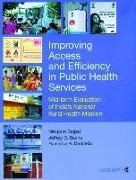Ulteriori informazioni
This book presents a systematic mid-term evaluation of the processes of the National Rural Health Mission (NRHM), India's biggest rural health programme. Data from District Level Health Surveys (DLHS), National Family Health Surveys (NFHS) and Sample Registration System (SRS) as well as primary data collected from field surveys and interviews with health functionaries have been utilized for undertaking empirical analysis in the study. It discusses the challenges and successes of the Mission with the help of extensive field observations, data analysis and inputs from experts on health and nutrition sectors focusing on maternal, newborn and child health issues and chronic diseases.
The book draws from data collected in field visits in the three states of Madhya Pradesh, Uttar Pradesh and Rajasthan. After assessing the NRHM processes and progress achieved so far, it discusses important ground realities, identifies the gaps and bottlenecks in the implementation of the Mission and recommends corrective actions.
The book will be useful for all those concerned with the issue of health and public administration in general and rural health in particular, such as, NGOs, IGOs, journalists, columnists, public policy planners, civil servants, and other practitioners.
Sommario
Statement on IAP Study - Ghulam Nabi Azad
Introduction
Health Sector in Rural India
Progress of NRHM so Far
Health Indicators: Regression Results
Evaluation of NRHM: Sample Survey of CHCs and PHCs
Evaluation of NRHM: Sample Survey of ANMs, ASHAs, and People's Participation
From the Field: Uttar Pradesh, Madhya Pradesh, and Rajasthan
Reducing Under-5 Mortality
Non-communicable Diseases
Concluding Remarks and Recommendations
Info autore
Senior Development Advisor (Full Professor according to Columbia University norms) at the Earth Institute at Columbia University in New York and Director of the South Asian Program. He is also a member of the United Nations Millennium Project on the Millennium Development Goals, the internationally agreed goals to reduce extreme poverty, disease, and hunger by the year 2015. Over the last 14 years, Dr. Bajpai has been working at different U.S. universities beginning with the Massachusetts Institute of Technology (MIT) in 1992; Harvard University from 1995 to 2002 and since July 2002 till date at Columbia University. Dr. Bajpai worked at the Indian Council for Research on International Economic Relations before moving to the Economics Department at MIT. Prior to his arrival at Columbia University, Dr. Bajpai worked for seven years at Harvard University, most recently at the Kennedy School of Government's Center for International Development leading the Harvard India Program and prior to that at the Harvard Institute for International Development, Harvard University. During this period, Dr. Bajpai also worked at MIT's Media Lab Asia (MLA) as a Senior Fellow.

